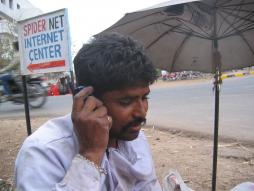Beauticians in Pakistan, sex-workers in Serbia, taxi drivers in Thailand. What do they have in common? They're all being helped by mobile phones which make it cheaper to start up businesses, and reduce the cost of operating. Besides sparking off "entrepreneurship," mobiles across the globe are giving a spurt to productivity, says a June 2008 World Bank report on The Role of Mobile Phones in Rural Poverty Reduction.
This report was missing from the citation of the GSMA Development Fund just produced, so we are reviewing it here.
Mobile phones are doing so in a number of ways -- by allowing business expansion among small entrepreneurs, helping the search for jobs in countries with high unemployment (Serbia) or temporary employment (Thailand), promoting mobile banking, and lowering 'transaction costs' by improving information flows between buyers and sellers.
This study is authored by Asheeta Bhavnani, Rowena Won-Wai Chiu, Subramaniam Janakiram, and Peter Silarszky with Deepak Bhatia. It expects the economic and social benefit of mobile telephony "will be highest in rural areas, which currently have less telephony services."
Both poverty and lack of information are "common bed partners", it argues, taking the optimistic view that disseminating information and serving rural areas "has double anti-poverty imperative."
It points to studies that point to "multiple benefits" of mobile phones -- from lowering negative aspects (like corruption, crime, high prices) to raising positive aspects (like levels of education, efficiency, health).
The report notes three 'global emerging trends' -- converging applications and devices, evolving pricing strategies and revenue streams, and the growth of virtual communities. With affluent markets saturated, the 'developing world' is increasingly attractive to the the private sector. "Rural access seems a logical next step in global penetration -- and development partners, the government, the private sector, and the World Bank have all acknowledged its importance," it says.
It suggests that a "clear, sophisticated methodology for measuring the social and intangible benefits" of mobilephones is yet to be developed. With rural kinship and family ties stronger, these benefits could be "the compelling yet untold story", it suggests.
PHOTO: An Indian cobbler accesses his mobile phone at Baramati, a small town in western India. Photo courtesy of the author.

Post new comment